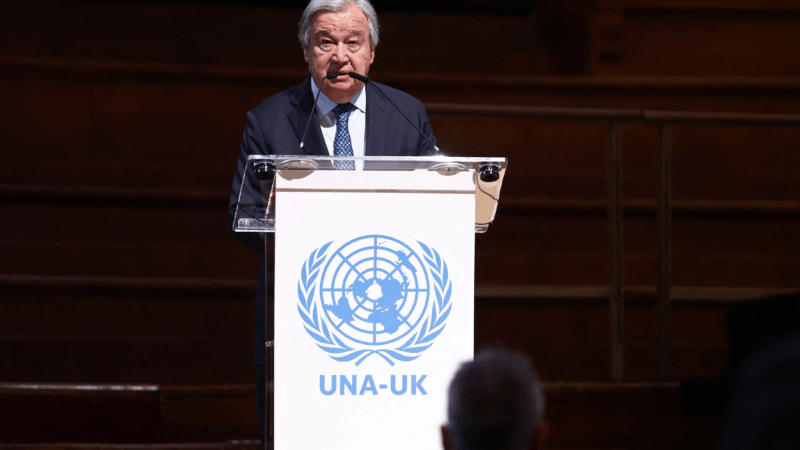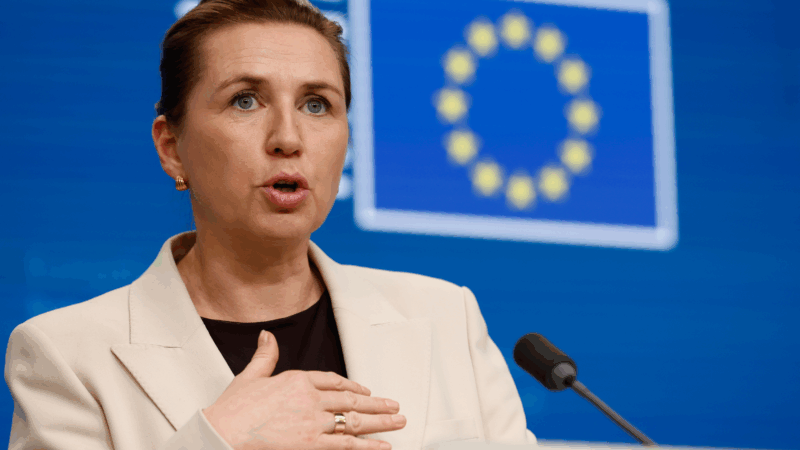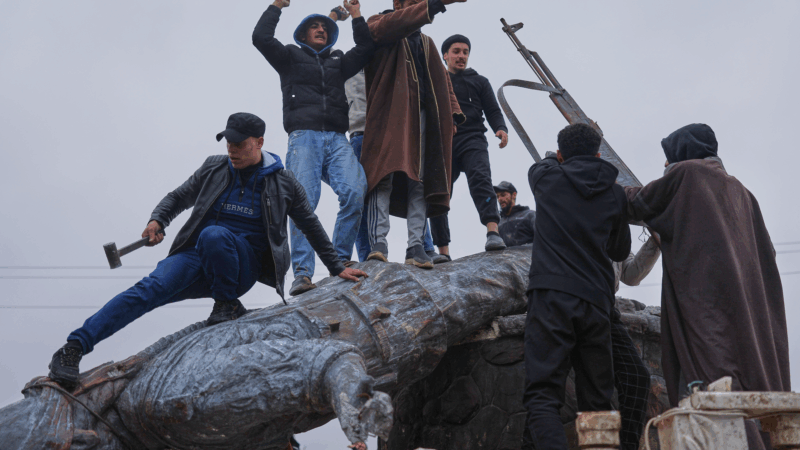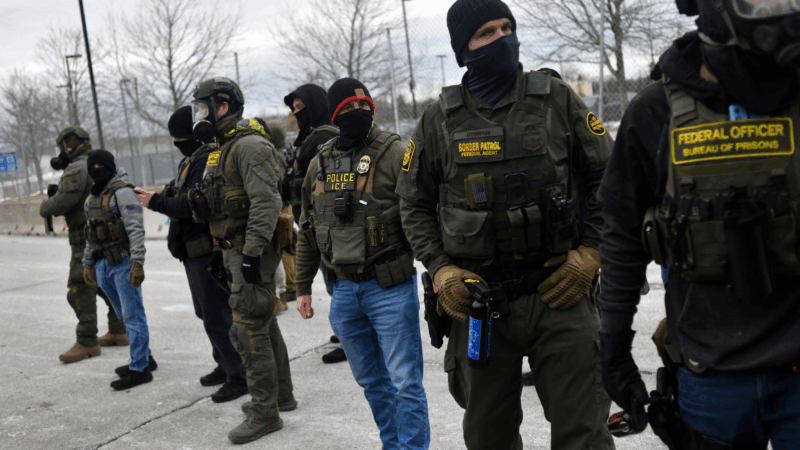Arrest of Palestinian protester shows escalation in Trump deportation efforts
Mahmoud Khalil, a recent Palestinian graduate student at Columbia University and green-card holder, was arrested by Immigration and Customs Enforcement officers over the weekend in what is likely one of the first high-profile detentions of a student who participated in the protests against the Israel-Hamas war.
The arrest follows through on one of President Trump’s executive actions, which directed the government to use all of its tools to punish those who have engaged in “antisemitic harassment and violence.” The executive action cites the federal law that authorizes deporting a foreign national who “endorses or espouses terrorist activity.”
The move is an escalation in Trump’s effort to increase deportations from the U.S. and strip protections from those who violate the new administration’s priorities.
In a social media post on Monday, Trump said the arrest was the first of many to come. He vowed that his administration “will find, apprehend, and deport these terrorist sympathizers from our country — never to return again.”
Michael Thaddeus, a mathematics professor at Columbia University, said the move seeking to strip Khalil’s green card and deport him violates the broader trust from foreign students who come to study in the U.S.
“They come because of their trust and belief that they could speak out freely while they’re here and not be imprisoned or harassed because [of] their political speech or activism or advocacy,” Thaddeus said.
Khalil was one of the Palestinian students who negotiated on behalf of the campus protesters who pressed Columbia to divest from Israel over its war with Hamas in Gaza.
Amy Greer, Khalil’s attorney, told NPR that ICE officers arrested Khalil in the lobby of his university-owned apartment.
First, they told Khalil his student visa had been canceled. But he’s not on a visa; he’s a legal permanent resident. His wife went to get his green card from their apartment, but officers said his lawful permanent residency had been revoked.
“I demanded to see a warrant or have a warrant shown to me or Mr. Khalil before they removed him, and the agent hung up the phone on me,” Greer said. “Mr. Khalil was under the impression that as a lawful permanent resident, that he had some modicum of protection that may not exist for people who do have student visas or who are undocumented.”
His wife, a U.S. citizen, later discovered he had been transferred to a detention facility in Louisiana, Greer said.
Government has burden to prove deportation
Green cards, also known as lawful permanent residency, allow people to live, work and travel as a U.S. citizen would. They can be revoked by an immigration judge for various reasons, including fraud in the application process or for criminal activity.
“If I have a permanent resident in removal proceedings, most of the time it’s because of a criminal activity,” said Kelli Stump, president of the American Immigration Lawyers Association, adding that once placed in immigration proceedings only an immigration judge can revoke the green card.
“The government bears the burden of proving the reason that this person is deportable from the United States. And then just depending on what ground we’re looking at, that’s where the fight ensues.”
DHS spokeswoman Tricia McLaughlin said Khalil had been arrested in support of Trump’s executive order on antisemitism, and that Khalil had “led activities aligned to Hamas, a designated terrorist organization.”
Separately, in a post on X, Secretary of State Marco Rubio linked to a story about Khalil’s arrest and wrote the administration would be revoking the visas or green cards of Hamas supporters so that they can be deported.
“We will vigorously be pursuing Mahmoud’s rights in court, and will continue our efforts to right this terrible and inexcusable – and calculated – wrong committed against him,” Greer said in a later statement.
Several groups planned rallies and gatherings around Manhattan on Monday in protest of Khalil’s arrest. Thaddeus, the professor, said the campus community was surprised ICE’s first target was someone with a green card, rather than someone without legal status, calling it “horrifying and a little bit unexpected.”
“It means that the strategy of the immigration police has gone in an unexpected direction,” he said.
Columbia University said it has seen reports of ICE officers around campus, and that the university “has and will continue to follow the law.”
“Consistent with our longstanding practice and the practice of cities and institutions throughout the country, law enforcement must have a judicial warrant to enter non-public University areas, including University buildings,” it said in a statement on Sunday.
Trump builds on first term efforts to strip status
During Trump’s first term, he took steps towards limiting visas for foreign nationals and revoking people’s immigration status, including denaturalization, or cancelling someone’s status as a naturalized U.S. citizen.
Towards the end of his last term, Trump’s Justice Department created a section within the immigration office to focus on denaturalization. The New York Times reported at the time that about 40% of the 228 denaturalization cases the DOJ had ever filed were brought during Trump’s four years in office.
USCIS also launched a task force to review whether people may have lied during their immigration application proceedings in order to get citizenship.
But immigration law experts have said that the number of people who might lie on forms is very small compared to the millions of people who are naturalized or receive green cards each year.
High-speed trains collide after one derails in southern Spain, killing at least 21
The crash happened in Spain's Andalusia province. Officials fear the death toll may rise.
United Nations leaders bemoan global turmoil as the General Assembly turns 80
On Saturday, the UNGA celebrated its 80th birthday in London. Speakers including U.N. Secretary-General António Guterres addressed global uncertainty during the second term of President Trump.
Parts of Florida receive rare snowfall as freezing temperatures linger
Snow has fallen in Florida for the second year in a row.
European leaders warn Trump’s Greenland tariffs threaten ‘dangerous downward spiral’
In a joint statement, leaders of eight countries said they stand in "full solidarity" with Denmark and Greenland. Denmark's Prime Minister Mette Frederiksen added: "Europe will not be blackmailed."
Syrian government announces a ceasefire with the Kurdish-led Syrian Democratic Forces
Syria's new leaders, since toppling Bashar Assad in December 2024, have struggled to assert their full authority over the war-torn country.
U.S. military troops on standby for possible deployment to Minnesota
The move comes after President Trump again threatened to invoke the Insurrection Act to control ongoing protests over the immigration enforcement surge in Minneapolis.






